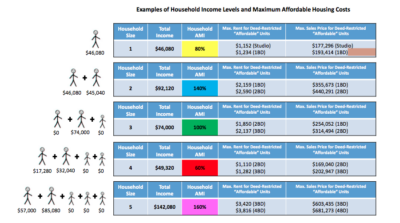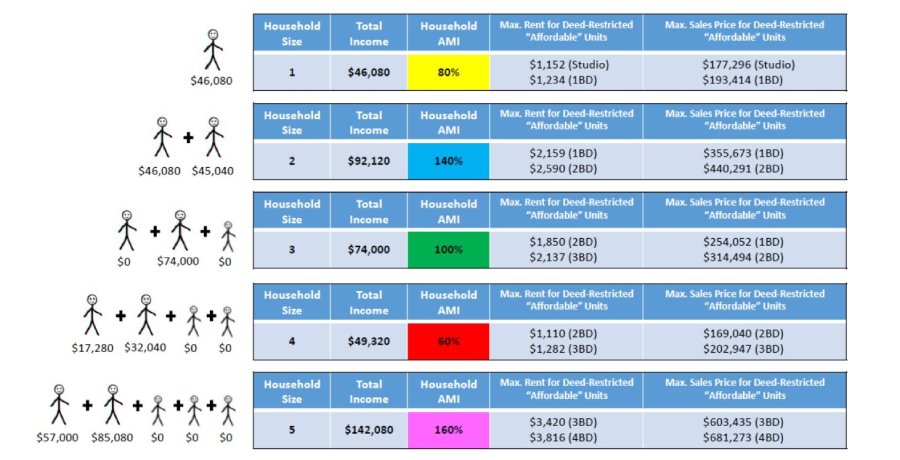Extraordinary Teen Council (ETC) Leads Off
A last-minute addition to the agenda for the March 20 work session of the Salida City Council (SCC) was a report from Stella Veazey, a Salida High School junior and the new representative from the Extraordinary Teen Council. The ETC was organized by Dibby Olson from Family and Youth Initiatives (FYI) in order to give teens more input to the city council and committees that oversee areas of interest and concern to them, such as Parks and Recreation and the Arts Committee.
Veazey reported that the Salida High School’s Kindness Campaign was putting “Kindness Boxes” around the school, in which students can put notes documenting random acts of kindness they witness: “And quarterly, we will give out a prize for the cutest act of kindness.”
Inclusionary Housing (IH) Update
 Next came an update on Inclusionary Housing (IH) from City Planner Kathryn Dunleavy. She reported that there are currently 72 deed-restricted units: “12 were done before the [IH] Ordinance was passed in 2018, 60 have been added since the ordinance. 26 are in process: seven for sale, two are rentals, and the remaining are from Jane’s Place [transitional housing], which has broken ground. 49 are scheduled for future development, including the Salida Crossing development.” A detailed list is on page three of the the meeting packet.
Next came an update on Inclusionary Housing (IH) from City Planner Kathryn Dunleavy. She reported that there are currently 72 deed-restricted units: “12 were done before the [IH] Ordinance was passed in 2018, 60 have been added since the ordinance. 26 are in process: seven for sale, two are rentals, and the remaining are from Jane’s Place [transitional housing], which has broken ground. 49 are scheduled for future development, including the Salida Crossing development.” A detailed list is on page three of the the meeting packet.
Dunleavy also reported that there is currently $175,000 in the city’s IH fund , which comes from “fees in lieu,” where a developer pays to the fund instead of constructing an affordable housing unit. “Fees in lieu is only an option for developments that are under the threshold for having to build one unit,” she explained.
As to future IH units, Dunleavy referred to a slide in her report that broke down the various levels of Area Median Income (AMI) that the IH Ordinance is structured to accommodate. She said that the AMI for Salida, which is calculated at a federal level, is “due to be updated in May – a 10 percent increase or more is possible. Rents can increase based on AMI increase and also the maximum sales price [allowed for for-sale units].”
“The question is, will this have an effect on the ordinance or not?”
Rents vs. AMI and Deed Restrictions Explained

Examples of differing levels of AMI with regard to IH costs. Image courtesy of the City of Salida
“We are working with the Chaffee Housing Authority (CHA) – there is a draft of community guidelines [for affordable housing] and the deed restriction document is done.” Dunleavy referred SCC members to City Attorney Nina Williams for questions.
“The CHA met last week, and the guidelines discussion was pushed to April,” replied council member Dominique Naccarato, who represents Salida on the CHA Board. (See separate article on the CHA Board meeting.)
“People in affordable housing now – will they have their rents protected, or are they subject to increase as well?” asked council member Alisa Pappenfort. Community Development Director Bill Almquist clarified that there is no “rent control” currently in Colorado and that landlords are free to raise rents. Thus, modest wage increases may still outstrip an increase in rents; a problem faced by anyone in the workforce. Times may change however: according to a February 16, 2023 Colorado Politics article, “Rent control bill clears House committee, but faces uncertain future”
Williams explained that a deed restriction on a unit “makes sure that [affordable housing] requirements are an enforceable contract, that runs with the land in perpetuity, and burdens owners and properties. Future owners are put on notice – the deed restriction sets conditions like, the owners must use it as a primary residence, the property can’t be used as a short-term rental, only as a long-term rental or permanent residence.” She added that other Colorado municipalities she works with look to Salida as an example of what a varied IH program can do for a community.
Member Jane Templeton asked about deed restriction with regard to resale prices: “Lots of people think that that [deed restriction] means the [resale] price on the unit can never go up.” Modest appreciation means that owners can build equity and wealth over time.
“It [resale value] can go up by 2 percent per year,” Williams said: “Permitted capital improvements count [towards resale value] as well.”
“If you go into affordable housing when you’re 63, do you have to keep working to qualify [to stay]?” asked Pappenfort. “Yes, for four years” Williams replied. The deed restrictions include a provision where retirees over age 65 are incentivized to remain in the community even after their income has dropped.
Council member Jane Templeton stated her appreciation for the presentation, suggesting it be widely publicized and saying that it addresses those who say that “nothing is being done”. “There is supposed to be an annual review for IH, so this type of data is useful,” said Mayor Pro-Tem Justin Critelli: “I would go a step further and see how much the free market adds affordability in communities that don’t have IH.”
Featured image: Examples of differing levels of AMI with regard to IH costs as of March 20, 2023. Image courtesy of the City of Salida







Recent Comments